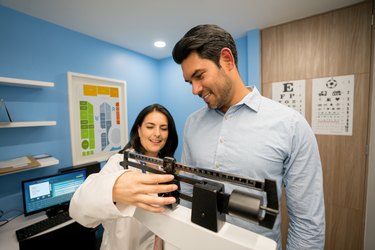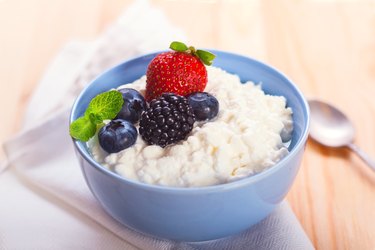
When you're looking for a program to help you lose weight, the options can seem overwhelming. Most have glowing testimonials on their websites and promise incredible results. But how do you know which one will work for you?
Here, we'll delve into the details on Medi-Weightloss — including how it works, what the food component looks like and the overall pros and cons — so you can decide whether it might be worth your time.
Video of the Day
Video of the Day
What Is Medi-Weightloss?
Medi-Weightloss — not to be confused with the Medifast weight-loss program — was founded in 2005 and operates franchises around the country that offer weight-loss counseling and supplements.
It is a medically supervised program that advocates a low-calorie, high-protein diet to induce weight loss and includes weekly check-ups, supplements and medication.
How Does the Program Work?
The program is broken up into three phases, the length of which fluctuate based on the person and how much weight he or she has to lose, according to the Medi-Weightloss website.
1. Phase One: This is considered the weight-loss phase, or the Acute phase. In this phase, you have a medical examination by a nurse practitioner or physician. He or she will note your medical history, including any current medications, medical conditions and anything else that could interfere with your weight loss.
You will undergo an electrocardiogram (ECG/EKG), blood panel and get a body fat percentage analysis. At this point, the practitioner will also take your weight and body mass index (BMI). This will help determine your daily calories.
Calculate Your BMI
Use LIVESTRONG.com's BMI Calculator to determine if your weight is in the healthy range.
Your goals will be determined as well as any barriers that could prevent you from reaching your goals. An individual plan will be formulated and decisions will be made with your health care provider on the course of your weight loss — whether it will include injections or other medications.
At this point with Medi-Weightloss, you will have weekly check-ins at the center to monitor your progress. You will also gain access to the members-only website.
2. Phase Two: This is called the Short-Term Maintenance phase of the program. At this point, you will be close to or may have already reached your goal weight, and you will start to increase the calories in your diet.
Much of the Acute phase is continued in the Short-Term Maintenance phase, including access to the website and weekly check-ins. You may have your body composition measured again to determine your progress.
3. Phase Three: This is called the Wellness phase. At this point, you will move to monthly check-ins. You will receive additional testing and continue with your current program.

Is Medi-Weightloss Healthy?
The Medi-Weightloss program revolves around a high-protein diet with minimal carbohydrates, with no mention of how much fat you should be eating. The program states that it works to get you into a state of ketosis (in which your body burns fat for fuel instead of sugar), but getting and staying in ketosis is a finely tuned process and it's not for everyone.
High-protein diets are popular for weight loss — the Atkins diet is one example. While these types of diets can help you lose weight in the short term, according to the Mayo Clinic, they can be hard to stick with for a significant amount of time.
Related Reading
Plus, there are risks to following a high-protein diet for an extended period of time, per the Mayo Clinic. If you're restricting carbohydrates too much, you may be at risk for nutritional deficiencies. And if you're relying on high-protein foods that are also high in saturated fat, like red meat or full-fat dairy, then you may put yourself at an increased risk for heart disease.
A high-protein diet is not a good idea for people with kidney disease, according to the Mayo Clinic, because it may worsen kidney function.
How Much Does Medi-Weightloss Cost?
Cost of the program varies based on your individual treatment plan.
What Can I Eat on Medi-Weightloss?
In general, you'll be eating foods high in protein and low in carbohydrates. Here's an example of what you might eat on Medi-Weightloss:
Protein Foods
- Lean meats: Beef, chicken, fish, turkey
- Cottage Cheese
- Eggs
- Nuts
Low-Carb Fruits and Veggies
- Greens: Spinach, lettuce, Swiss chard
- Raspberries and blueberries
- Zucchini
- Cauliflower and broccoli
- Celery
- Radishes
- Cucumbers
- Avocado
Fats
- Olive oil, canola oil, coconut oil
Some foods, such as nuts and dairy, contain all three macronutrients, so if you're actively counting carbs, you'll need to include them.
How Much Weight Can I Lose With Medi-Weightloss?
How much weight you'll lose depends on factors like your personal calorie restriction, your exercise plan, how strictly you adhere to the program, your personal metabolic factors and how long you are on the program.
Pros and Cons
Like any weight-loss program, there are pros and cons that can help you decide if this program might work for you.
Pros
Support: Weekly check-ins with a healthcare provider is a huge plus of this program. According to June 2016 research published in the Journal of Behavioral Medicine, social support seems to be helpful in weight loss and maintenance. Accountability can help you stick with a program, and this might aid in your weight-loss goals.
Personalization: Weight loss is never a one-size-fits-all approach. Medi-Weightloss allows you to discuss your medical history and other personal factors with a health care professional before embarking on your weight-loss journey.

Cons
Not food-focused: Instead of focusing on an overall healthy eating pattern, the program hones in on protein and calories. There is no mention of nutrition education or the best healthy eating patterns, which would help people maintain their weight loss in the long run.
Not scientifically based: There is no scientific basis to support this specific approach to weight loss. The research conclusions listed on the website do not have actual published studies cited for reference and without those, it is impossible to know if those are factual conclusions.
Time commitment and availability: It is advisable, in order to reach your goals, that you attend weekly meetings. This also means that in order to succeed in this program, you must live near one of the 91 centers open in the United States.
Related Reading
Cost: There is no cost listed on the Medi-Weightloss website. The cost is variable to each individual. This open-ended type of pricing can be difficult to budget for when choosing a weight loss program. There are also packaged foods you can buy, but they are not mandatory for the program. Keep in mind, though, that high-protein foods can be costly.
Physical activity is not part of the program: Medi-Weightloss does not indicate that physical activity is an integral part of weight loss. According to August 2017 research published in Diabetes Spectrum, though, exercise enhances weight loss and contributes to keeping it off.
In addition, calorie restriction has been shown to decrease lean body mass (aka muscle) in the absence of exercise. According to a January 2017 study published in Medicine and Science in Sports and Exercise, people who practiced only calorie restriction lost lean muscle mass. Study participants who only exercised for weight loss, and those who combined a reduced calorie diet with exercise, did not lose lean muscle mass.
Comparison to Other Weight-Loss Programs
Medi-Weightloss | Atkins | Jenny Craig | WW | Nutrisystem | |
Cost | Undisclosed program fees + cost of high-protein foods | High-protein foods, no program fees | Starts at $12.99/day | Starts at $3.19/week | Starts at $8.93/day |
Support | Yes | No | Depends on plan | Depends on plan | Depends on plan |
Nutrition | Cook your own meals; supplemental food available for purchase | Cook your own meals; supplemental food available for purchase | Depends on plan | Cook your own meals | Food is provided |
Exercise | Does not overtly promote exercise for weight loss | Does not promote exercise for weight loss | Promotes active lifestyle for weight loss | Fitness is part of the program | Exercise is encouraged |
Sustainability | Depends on the nature of caloric restriction | Yes | Depends on budget | Yes | Depends on budget |
Bottom Line: Is Medi-Weightloss a Good Program?
Like any weight-loss program, you get out of it what you put into it. This program may have some benefits that appeal to you, such as weekly support and accountability, but the cost, nutrition approach and lack of exercise may not.
Related Reading
- Medi-Weightloss.com
- Journal of Behavioral Medicine: "The role of social support in weight loss maintenance: results from the MedWeight study."
- Diabetes Spectrum: "Role of Physical Activity for Weight Loss and Weight Maintenance"
- Medicine and Science in Sports and Exercise: "Effects of Weight Loss on Lean Mass, Strength, Bone, and Aerobic Capacity"
- Mayo Clinic: "Are high-protein diets safe for weight loss?"